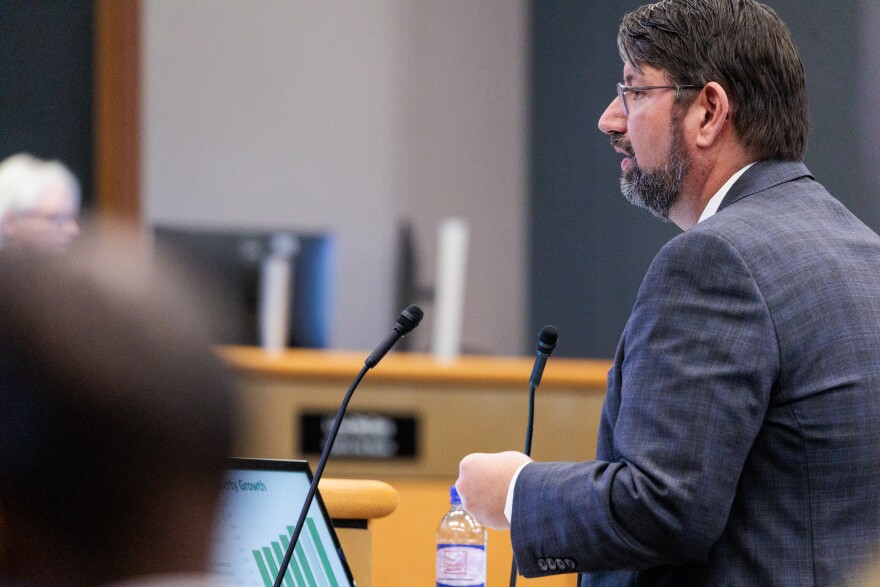Henrico and Hanover county administrators detailed their upcoming budget priorities for the fiscal year, which begins July 1.
Each introduced myriad fiscal 2026 policies aimed at addressing fluctuating housing assessments as the nation's housing market develops at a slow rate. Both budgets would expand tax relief for residents, strengthen benefits for government workers and prioritize education and public safety.
Although elected officials expressed some concern over the potential absence of federal funds and the shared, looming fear of another regional water crisis, Hanover County Administrator John Budesky expressed confidence in the county’s ability to continue to fund critical social services.
Budesky recently addressed the board and presented a budget “that aligns with what we’re hearing from our residents.”
“No surprises” in Hanover’s $413M general fund
The projected general fund primarily focuses on strengthening education, public safety and investment in critical infrastructure.
This budget’s public hearing is scheduled for 6 p.m. April 2, and the final vote is set for 2 p.m. April 9. Both will occur at the county administrative building, located at 7516 County Complex Rd.
Budesky spoke with VPM News before walking supervisors through what’s changed year-to-year in the budget process — including what residents can expect in their monthly housing and utility costs.
“One of the themes that you'll hear me talk more about is there shouldn't be a lot of surprises in this budget,” Budesky said. “We've been very intentional about planning how we want to invest in our community for the future.”
One area Hanover’s been consistent in is the county’s long-standing property tax rate: 81 cents per $100 of assessed value. The rate hasn’t changed since 2007 and is reportedly the lowest in the region.

Budesky said the goal is to remain competitive among its peers while attracting new residents and businesses. Low property tax rates and no meals, business, professional and occupational license tax aid in that task, he added.
A cost residents might feel is a planned 5% increase in water and sewer fees to support utilities infrastructure. However, that rate will only amount to an average residential bill increase of $7.84 every two months.
The county also plans to increase tax relief funding for senior and disabled residents by $4.7 million and expand services for residents with mental health, developmental disabilities or substance use disorders by $17.6 million.
Nearly 60% of Hanover’s budget is dedicated to education and public safety. The county’s school board reviewed and approved its budget request over the last two months, when HCPS prioritized cost-of-living pay increases and improvements to the teacher salary scale.
Teachers will receive an average increase of 6.8%. Hanover’s government employees are also set to receive a 3% merit increase, and the budget allocated funds for new public safety positions — like additional firefighter medics and animal control specialists.
This year's budget also accounts for school construction costs, including a replacement for Mechanicsville Elementary School — one of several aging buildings identified in a 2018 study.
Long-range plans to replace Battlefield Park, Beaverdam and Washington-Henry elementary schools are already underway. An additional $8.5 million will expand The Hanover Center for Trades and Technology in FY26.
Other capital improvements include $60 million for a new public safety building and training center at the Courthouse Complex to accommodate the growing needs of the sheriff’s department and first responders.
Shelly Wright, director of the county’s budget division, said that the county's debt services might increase as new projects come online.
“We have the ability to be able to be very deliberate about when we go out to the market, because we're in a good financial position, so that we can maximize the interest rates and things like that,” Wright told VPM News. “When you see our debt service go up, it is a direct correlation to something that was approved and issued for debt beforehand.”
“Tax relief is on the way” in Henrico
Henrico’s general fund balance is at $1.35 billion, an increase of 8% from last year — more than double the size of Hanover’s projected budget.
A majority of the funds would come from the county’s real estate tax rate, which is currently 85 cents per $100 of assessed value. The proposed budget would reduce that to 83 cents.
“Our Board of Supervisors wanted to come out ahead and provide some stability and let folks know that tax relief is on the way,” County Manager John Vithoulkas said Tuesday.
Personal property tax rates for vehicles and businesses in Henrico would also be reduced: from $3.40 and $3.50 respectively, to $3.35 per $100 of assessed value. According to county officials, the proposed cuts would reportedly benefit around 115,000 homeowners, 320,000 vehicle owners and 20,000 businesses.
Expanding tax relief means Henrico will seek new revenue resources through a planned increase to the county’s personal property tax rate for data centers.
Items like computers and other equipment used at data centers have been taxed at a rate of $0.40 per $100 of assessed value since FY18, but the proposed budget increases that rate to $2.60 per $100.
Vithoulkas said during a recent budget work session that the new data center equipment tax rate would still be the lowest among Virginia’s heavily populated data center hubs — like the counties of Arlington, Fairfax and Loudoun.
Henrico continues to strengthen investments in education and public safety through the advancement of capital projects like several ongoing school infrastructure projects
Social programs like the school system’s mental health initiative Henrico CARES and the county’s environmental HEART program will continue to receive funding. This budget also accounts for teachers and county employees to receive a 6% raise.
Vithoulkas said Henrico officials allocated $50 million to improve the county’s water utilities system. That funding is designed to offer flexibility as officials consider options presented to them in their internal review of the January water outage.
Henrico leaders have voiced their intention to seek solutions for its water distribution challenges, independently and regionally.
“As a county, we’re committed to doing everything we can, as fast as we can, to provide a public water system that meets our community’s needs in the 21st century,” said Brookland Supervisor Dan J. Schmitt, who chairs the board.
Henrico’s supervisors now have multiple weeks to review each budget line item before a scheduled public hearing at 5 p.m. March 25.



